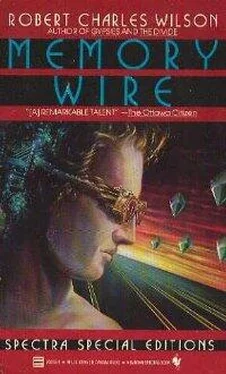Robert Wilson - Memory Wire
Здесь есть возможность читать онлайн «Robert Wilson - Memory Wire» весь текст электронной книги совершенно бесплатно (целиком полную версию без сокращений). В некоторых случаях можно слушать аудио, скачать через торрент в формате fb2 и присутствует краткое содержание. Год выпуска: 1987, ISBN: 1987, Издательство: Bantam Spectra, Жанр: Фантастика и фэнтези, на английском языке. Описание произведения, (предисловие) а так же отзывы посетителей доступны на портале библиотеки ЛибКат.
- Название:Memory Wire
- Автор:
- Издательство:Bantam Spectra
- Жанр:
- Год:1987
- ISBN:978-0-553-26853-9
- Рейтинг книги:4 / 5. Голосов: 1
-
Избранное:Добавить в избранное
- Отзывы:
-
Ваша оценка:
- 80
- 1
- 2
- 3
- 4
- 5
Memory Wire: краткое содержание, описание и аннотация
Предлагаем к чтению аннотацию, описание, краткое содержание или предисловие (зависит от того, что написал сам автор книги «Memory Wire»). Если вы не нашли необходимую информацию о книге — напишите в комментариях, мы постараемся отыскать её.
Memory Wire — читать онлайн бесплатно полную книгу (весь текст) целиком
Ниже представлен текст книги, разбитый по страницам. Система сохранения места последней прочитанной страницы, позволяет с удобством читать онлайн бесплатно книгу «Memory Wire», без необходимости каждый раз заново искать на чём Вы остановились. Поставьте закладку, и сможете в любой момент перейти на страницу, на которой закончили чтение.
Интервал:
Закладка:
“ Brazil,” Teresa said.
“The sky,” Mrs. Gupta said.
“Well, yes. It’s true. The sky.”
The old woman nodded and handed it back. “What should I do?”
“Nothing yet.” Teresa pulled up a chair opposite her. “You want to remember?”
The old woman nodded. Her turtle eyes regarded Teresa gravely. “It’s been a long time. I was married. Before Madras. His name was Jawarhalal. He died in the Event. I do remember—I spend a lot of time remembering. But time passes.” She shrugged. “It gets dim.”
“I’ll do what I can,” Teresa said. “But I can’t promise. Do you understand?”
“Yes.”
Teresa closed the stone in her fist.
She did not do this often. It was too much like a parlor trick, too much like something a charlatan might do for money. Word had spread through the Floats that she had the skill, and so once or twice a week, people like Mrs. Gupta would show up at her door. Old people. Help me remember. And so she would rescue some fraction of their lives from the rolling surf of oblivion. Their pleas were heartfelt and often heartbreaking, and Teresa could not bring herself to resist them.
Though of course there was a terrible irony in it. She closed the gem in her left hand and with her right clasped Mrs. Gupta’s dry, ancient fingers. She closed her eyes.
The images erupted at once. They were distinct and colorful, and if it were not for the necessity of describing them to Mrs. Gupta, she might have allowed them to become more real: sights and sounds and odors. “A stony beach.” She envisioned it from a position up the littoral. “There are people in the waves. Children. The stones go up into a sort of wall. Old stone buildings behind it—a temple of some kind.”
She heard the rasp of the old woman’s indrawn breath. “The beach at Mahabalipuram.” Faintly: “We went there, yes…”
She did not see Mrs. Gupta but felt her presence, a hovering sense of self. “You’re there,” she said. “You’re wearing a blue sari. It feels like real silk. Very fine. Your hair is tied back. Wire glasses. And the mark on the forehead, the, uh—”
“Tika.” It was a whisper.
“The wind is off the ocean,” Teresa said. “The sky is clean and clear. It’s not hot. The children are laughing. You have a shawl…”
She could not say where they came from or how she derived them, but she paged through the memories for almost an hour, the beach at Mahabalipuram, the family char-poy, a holiday in New Delhi. It faded at last into a single stark vision of the fractured, blackened dome of the Madras reactor, a soldier wielding the butt of his rifle; she kept the image to herself. “I’m sorry,” she said. “That’s all.”
Mrs. Gupta nodded and stood up. She was not visibly moved, but Teresa sensed the old woman’s gratitude.
At the door Mrs. Gupta turned and said, “Is it true what they say about you?”
She stood warily in the foyer. “What do they say about me?”
“That you came out of the fire a dozen years ago. That you don’t remember your childhood.” She nodded slowly. “Yes. It’s true.”
“You can’t do what you did for me—use the stone to remember?”
“No,” Teresa said.
Mrs. Gupta bobbed her head, accepting this strange intelligence. “May I come back? There are other things,” she said, “other times—”
“Come back if you like,” Teresa said. “But I should warn you. I’ll be away for a while.”
She closed the door.
That night she was full of anxiety.
By choice she lived alone. By choice she lived in the Floats. Since her gallery successes, she could have bought ID and moved to the coast, lived fashionably there for a while. But the pontoon city soothed her. It was a barrio bajo —a slum, but it was also el otro barrio —a separate world. In spite of or maybe because of this poverty, the Floats preserved a certain low-rent gentility she inevitably missed when she visited the mainland. The mainland world -changed rapidly and often, and the most successful of its denizens were too often the most voracious—the predators. Here, the presumption of failure served as a great equalizer.
Too, she liked the nearness of the ocean. All this water had been locked in by the huge federal tidal dams, sheltered from the excesses of the sea but exposed to its gentler moods. On rainy days she would walk out along the concrete margins of the seawall and watch the clouds angle in from the western horizon. The ocean talked to her; sometimes— not tonight—it soothed her to sleep.
So why are you leaving?
She lay in bed and groped for an answer.
The journey she was contemplating might be dangerous. She knew that. It would be a vacation, Wexler had told her, much deserved, and only incidentally a courier run. But Byron was more skeptical. They would be entering a realm, he said, in which nations and criminals had long since grown indistinguishable. “Hard money,” Byron had said, “and hard people.” For years the Exotic stones had been the pivot of progress, the world’s single most valuable resource. They had capsized the sovereignty of nations and the supremacy of corporate empires; a protracted war had been waged over them. In this environment, smuggling— even the sort Cruz Wexler had planned—was more than a risky business.
But I have to go, she thought. She felt the pressure. She could not continue doing for people like Mrs. Gupta what she could not do for herself. She had unearthed, these last three years, a nugget of herself, and that was good; but it was insufficient and incomplete.
She was insane to go. In the Floats, because of her artwork and her affinity for the dreamstones, people sometimes called her crazy. “Crazy Teresa,” they said.
They thought it was a joke. But tonight, lying sleepless in her bed, faint moonlight etching out the silhouettes of the spider plants across the floorboards, she wondered if it was.
When she did sleep, she dreamed of the child again.
The child was no older than ten. She was undernourished and ragged, she wore old denims gone at the knees, cheap athletic shoes tied with twine, a bowl haircut. She stood in limbo, somehow spotlit. Her arms and legs were thin. But it was her eyes Teresa would remember.
They were very wide, very old, terribly knowing.
Teresa, in her dream, was trapped by the pressure of those eyes. She wanted to turn away; she could not.
“Find me,” the girl said. “Help me. Find me.”
She woke up sweating. The darkness was expansive. She pulled her angular knees up to her breasts and hugged herself. It was at times like this that she felt most profoundly alone.
“All right,” she said into the darkness.
The balsa rocked silently in the swell. The wind from the sea lifted gauze curtains like wings.
“All right.” It was a whisper. “I’ll do what you want. Just leave me alone.”
2. In the morning Byron came in a motor launch down a crowded market canal with the stranger, the man from the mainland. The stranger’s name was Raymond Keller.
Teresa had agreed to accept a third person on their journey. She had, however, retained veto power over Byron’s choice. It seemed now like a wise decision. Looking at Raymond Keller, she was not certain she wanted to spend much time with him.
She led both men up to the narrow balcony that surrounded her studio, to the wicker chairs there. Byron made introductions; she brought out iced bottles of Mexican beer; the three of them sat. Strange mixture, she thought. Byron, of course, looked displaced in almost any rational setting. He cultivated the look: outlaw ’lith chemist, wild veteran of the Brazilian War, scarred and tattooed and inscrutable behind his moon-shaped lenses.
Читать дальшеИнтервал:
Закладка:
Похожие книги на «Memory Wire»
Представляем Вашему вниманию похожие книги на «Memory Wire» списком для выбора. Мы отобрали схожую по названию и смыслу литературу в надежде предоставить читателям больше вариантов отыскать новые, интересные, ещё непрочитанные произведения.
Обсуждение, отзывы о книге «Memory Wire» и просто собственные мнения читателей. Оставьте ваши комментарии, напишите, что Вы думаете о произведении, его смысле или главных героях. Укажите что конкретно понравилось, а что нет, и почему Вы так считаете.












